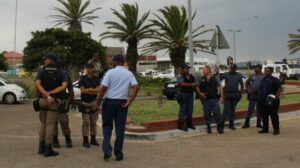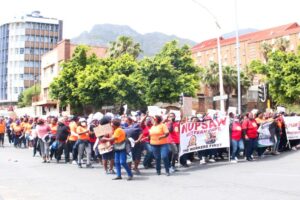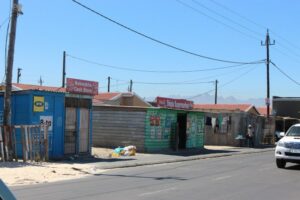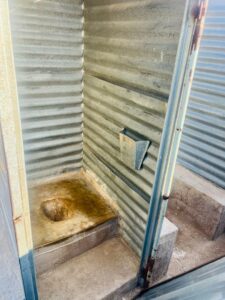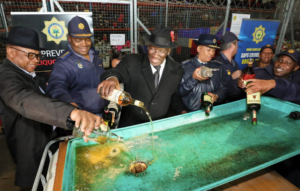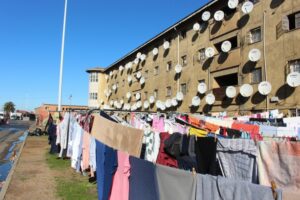In 2019, Paul Chouta was held for two years at the Kondengui Central Prison in the Cameroonian capital of Yaounde, a maximum-security prison notorious for overcrowding and poor sanitary conditions, while awaiting a trial verdict. He was later sentenced to 23 months’ imprisonment in a defamation case which rights groups say was marred by fair trial violations.
Chouta, 31, a reporter critical of the government of Paul Biya and administrator of the Facebook news and information platform Le TGV de l’info, now lives in perpetual fear. It’s not just the post-traumatic stress disorder from his incarceration that makes Chouta panicky. He is unsure of when next he will be abducted and what his fate will be, following four such incidents perpetrated by unknown men since 2017.
The last time he was attacked, his abductors bundled him into a black pick-up truck and drove to a secluded spot on the outskirts of Yaounde, punching him repeatedly along the 12-kilometre journey.
The abductors horribly disfigured Chouta’s face, tortured him with stones and rods, and then abandoned him, naked, for dead. He was lucky to survive such gratuitous violence.
Other journalists, though, have not made it from the hands of their kidnappers. In January, there was global outrage when the mutilated dead body of radio presenter Martinez Zogo, who had been missing for five days, was found on the outskirts of Yaounde. Zogo had been an outspoken critic of institutionalised corruption and had before his demise denounced on air a case of suspected embezzlement of public funds involving Jean-Pierre Amougou Belinga, a business and media mogul with strong government connections.
Even before the dust could settle on Zogo’s abduction and subsequent killing, a second radio presenter, Jean-Jacques Ola Bébé, was found dead near his home in Yaounde, with signs of bullet wounds. Bébé was a close associate of Zogo and had been at the forefront of the calls for justice for his murdered colleague.
The two killings give Cameroon the grim distinction of being the country with the highest number of media worker deaths in the world this year to date. Prior to this year, two journalists had lost their lives while in the line of duty in Cameroon over the last 15 years.
United Nations Human Rights spokesperson Seif Magango said: “We are deeply concerned about the safety of journalists in Cameroon” as no less than three other Cameroonian journalists reported in January alone that they had received credible threats from unknown persons.
In recent times, acts of repression on journalists in Cameroon have taken a dangerous turn. Chouta, who has lived the experience first-hand, tells Equal Times: “It’s about an environment of terror where they have decided to kill journalists and whistleblowers who have decided to speak the truth in a context where vices have taken over societal values.”
One of the most dangerous media landscapes in Africa
Cameroon has a very diverse media landscape, counting over 650 registered newspapers, some 200 community and commercial radio stations, and about 100 television channels for a population of 26 million people.
However, media freedom and journalist safety in Cameroon has been in decline over the last decade. This is because the government’s fight against Islamist insurgents Boko Haram in the north of the country and the protracted conflict between majority French-speaking government forces and Anglophone separatists in the Southwest and Northwest regions has resulted in journalists being under siege on several fronts.
Reporters Without Borders classifies Cameroon as having one of the most dangerous media landscapes on the African continent, marked by hostility and precariousness, while the Committee to Protect Journalists (CPJ) has found the central African nation, which has been ruled by its 90-year-old president Paul Biya since 1982, to be amongst the worst jailers of journalists in Africa.
Media workers are routinely attacked, threatened, censored, and imprisoned on anti-state, criminal defamation, false news, and/or retaliatory charges, as documented by the CPJ. Several journalists have been forced to go on exile.
There are currently five journalists in the dreaded Kondengui Central Prison, amongst which four of them – Tsi Conrad, Mancho Bibixy, Thomas Awah Junior and Kingsley Njoka – are being held on anti-state charges in connection to the ongoing Anglophone conflict.
Besides Egypt and Eritrea, the CPJ has also found that Cameroon currently jails journalists for the longest periods of time, including using lengthy pre-trial and arbitrary detention, where journalists have been held incommunicado, and convictions by military courts, amongst other serious violations of fair trial and due process rights.
In one instance, Samuel Wazizi, a presenter with the local broadcaster Chillen Muzik and TV, was arrested in the restive city of Buea and held incommunicado before dying in government custody in August 2019, a fact that was only admitted by the Cameroonian government in June 2020. Despite President Biya being quoted as personally committing to investigate Wazizi’s death, his killing remains unresolved, and the journalist’s corpse is yet to be handed to his family for burial.
Prior to Wazizi, the last journalist to die under suspicious circumstances was Cameroun Express editor Bibi Ngota who died in Kondengui in 2010 where he was detained while investigating allegations of government corruption.
Angela Quintal, CPJ Africa’s program coordinator, tells Equal Times that Cameroon’s media laws are partly to blame for its punitive environment for journalists. She cites the enactment of new laws that were so broadly defined that it was abused to crack down on criticism and dissent, and ultimately to jail journalists.
“Currently, four of the five journalists in jail in Kondengui are there because the anti-terror law enacted in 2014 was used against them. CPJ has documented an increase in journalists being jailed or attacked since late 2016 on anti-state charges,” she says.
Quintal tells Equal Times that the CPJ has been advocating for the abolition of criminal defamation and the reform of Cameroon’s overly broad anti-terror law which has been used to repress dissent and silence criticism. Quintal also cites censorship and self-censorship as hurdles, especially in the English-speaking regions where journalists are caught between government forces and separatist fighters.
“The issue of surveillance, both physical and digital, also feeds into the deteriorating conditions for the press, as does the economic challenges and financial viability of media outlets in Cameroon and the dire conditions that journalists have to operate under,” Quintal tells Equal Times.
She says that the horrific torture and murder of Martinez Zogo brought violence against journalists to the political heart of the country. “Yet the violence by members of the security forces towards journalists, indeed to civilians in general, as well as general depravity and cruelty that has been condoned thus far, has been a cause for concern in the Northwest and Southwest regions since late 2016 and became even more worrying as attitudes hardened on both sides…The lack of accountability and impunity when it comes to violence against journalists are among the reasons that it persists to this day,” says Quintal.
No easy way out
A spokesperson of Cameroon’s Ministry of Communication did not respond to our request for comment. But the government maintains that Cameroon is a state of law where fundamental freedoms, including freedom of the press, are guaranteed. The multiplicity of print, broadcast and online media organs in the country have been repeatedly cited by the government as an indicator of press freedom.
The Cameroon Journalists’ Trade Union (SNJC) – the largest journalists’ trade union in the country and an affiliate of the International Federation of Journalists – however, disagrees. The union has been working to make the environment better for media workers. Following the killing of Martinez Zogo, SNJC declared ‘Black Wednesday’, a nationwide weekly campaign to demand justice for the murdered radio presenter and advocate for a better environment for media workers.
Marion Obam, the national president of the SNJC, tells Equal Times that the targeting of journalists and other media professionals has been so recurrent that there is need for urgent action.
“Despite the fairness of the constitution of our country towards freedom of expression, there is still a general atmosphere of fear considering that a basic offence like defamation is still considered criminal with the potential for long-term imprisonment and huge fines,” Obam explains.
Obam says that the SNJC has been clamouring for better media legislation, notably an access to information act which will ease the work of journalists to obtain information held by public officials, the decriminalisation of media offences, and the establishment of a truly independent media regulator and national press card commission which issues licences to journalists.
There was brief hope in 2012 when the government organised the National Communication Forum to overhaul the country’s media landscape. Back then, the government said it was keen to pursue reforms on media legislations and the creation of a special media trust, amongst others. But those ambitions have not yet materialised.
While media workers in Cameroon wait for reforms in perpetuity, acts of violent repression against journalists continue to escalate. Jude Viban, national president of the Cameroon Association of English-Speaking Journalists (CAMASEJ), says: “Impunity for crimes against journalists and other media workers in Cameroon is unacceptable and provocative. It must stop.”
